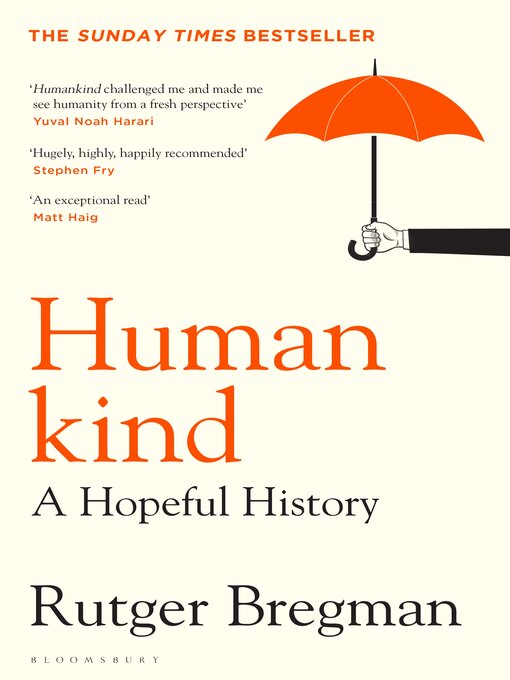- Available now
- New eBook additions
- New kids additions
- Try something different
- Peppa Pig小猪佩奇
- Classic Chinese Tales 中国古典神话故事
- See all ebooks collections
A Guardian, Daily Telegraph, New Statesman and Daily Express Book of the Year
'Hugely, highly and happily recommended'
Stephen Fry
'You should read Humankind. You'll learn a lot (I did) and you'll have good reason to feel better about the human race'
Tim Harford
'The book we need right now'
Daily Telegraph
'Made me see humanity from a fresh perspective'
Yuval Noah Harari
It's a belief that unites the left and right, psychologists and philosophers, writers and historians. It drives the headlines that surround us and the laws that touch our lives. From Machiavelli to Hobbes, Freud to Dawkins, the roots of this belief have sunk deep into Western thought. Human beings, we're taught, are by nature selfish and governed by self-interest.
Humankind makes a new argument: that it is realistic, as well as revolutionary, to assume that people are good. The instinct to cooperate rather than compete, trust rather than distrust, has an evolutionary basis going right back to the beginning of Homo sapiens. By thinking the worst of others, we bring out the worst in our politics and economics too.
In this major book, internationally bestselling author Rutger Bregman takes some of the world's most famous studies and events and reframes them, providing a new perspective on the last 200,000 years of human history. From the real-life Lord of the Flies to the Blitz, a Siberian fox farm to an infamous New York murder, Stanley Milgram's Yale shock machine to the Stanford prison experiment, Bregman shows how believing in human kindness and altruism can be a new way to think – and act as the foundation for achieving true change in our society.
It is time for a new view of human nature.
-
Creators
-
Publisher
-
Release date
May 19, 2020 -
Formats
-
OverDrive Read
- ISBN: 9781408898963
-
EPUB ebook
- ISBN: 9781408898963
- File size: 3584 KB
-
-
Accessibility
Publisher statement (EPUB)
The publisher provides the following statement about the accessibility of the EPUB file supplied to OverDrive. Experiences may vary across reading systems. After borrowing the book, you may download the EPUB files to read in another reading system.
Ways Of Reading
Appearance of the text and page layout can be modified according to the capabilities of the reading system (font family and font size, spaces between paragraphs, sentences, words, and letters, as well as color of background and text).
Not all of the content will be readable as read aloud speech or dynamic braille.
Has alternative text descriptions for images.
Conformance
The publication contains a conformance statement that it meets the EPUB Accessibility and WCAG 2 Level AA standard.
This publication claims to meet EPUB Accessibility 1.1 WCAG 2.2 Level AA.
Navigation
Elements such as headings, tables, etc for structured navigation.
Additional Information
Page breaks included
-
Languages
- English
-
Reviews
-
Publisher's Weekly
April 6, 2020
Dutch historian Bregman (Utopia for Realists) puts a positive spin on human behavior in this intriguing survey of politics, literature, psychology, sociology, and philosophy. To prove his hypothesis that humankind is basically good, Bregman reevaluates some of the most entrenched cultural narratives suggesting otherwise. For example, six Tongan boys shipwrecked on an island in the 1960s didn’t beat each other senseless—à la William Golding’s characters in The Lord of the Flies—but lived harmoniously until their rescue a year later. Bregman also revisits the Stanford Prison Experiment (researchers muddled the study by ensuring that students chosen as guards would be cruel to those posing as prisoners) and the 1964 murder of Kitty Genovese, in which 37 bystanders supposedly heard her cries for help but failed to intervene (Bregman offers evidence that several people actually did call the police, and that one of Kitty’s neighbors ran directly to her aid). He even attempts to fold the Holocaust into his theory, but his explanation that the Nazis “believed they were on the right side of history” fails to either hearten or persuade. Overall, however, this intelligent and reassuring chronicle disproves much received wisdom about the dark side of human nature. Readers looking for solace in uncertain times will find it here.
-
Loading
Why is availability limited?
×Availability can change throughout the month based on the library's budget. You can still place a hold on the title, and your hold will be automatically filled as soon as the title is available again.
The Kindle Book format for this title is not supported on:
×Read-along ebook
×The OverDrive Read format of this ebook has professional narration that plays while you read in your browser. Learn more here.

